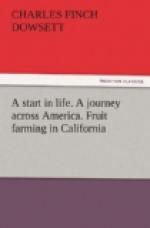I could not refrain from writing several times in my note-book, “glorious sunshine.” Hitherto we have had mountains continuously in sight, but now they are out of vision. This being Saturday we see markets at the towns we go through; at Habwood and Flatonia especially was this noticeable. The population seemed almost altogether negro. I observed a negro and his wife, well dressed, riding on horseback in the old English pillion style; another negro and his wife, and about twelve children, in a capacious kind of wagon-buggy, and many negroes and negresses, the latter dressed in white and gay colours, standing at their pretty verandahed cottages.
We now pass a spot where a train was stopped and the passengers robbed some time ago, by Jesse and Frank Jeames and the Ford Brothers. The modus operandi is for all the men to be secreted but one, who stands on the line holding up a red flag which indicates danger; the engineer then stops and the men spring aboard; some hold revolvers to the heads of the engineers, and others go through the train and rob the passengers. The robbers shout out “hands up,” and one man points his weapon at the passenger’s head, whilst another rifles his pockets. If a passenger fails to hold up his hands he is shot down. A passenger on the Northern Prairies told me of a fellow passenger, who under such circumstances having a revolver, aimed at a robber and pulled the trigger, but it missed fire, and he was instantly shot down. But these attacks are now more rare, and the officials are more prepared for them. Sometimes the robbers get on board the train as passengers, and act suddenly in concert. All along the country now we pass the cabins of the slaves, familiarised to us by “Uncle Tom’s Cabin.” These cabins are pleasant little houses with verandahs, and I reflected how favourably they compared with the “homes” of many of the London poor, and how happy the slaves might have been but for the knowledge that at any time they were liable to be sold like a mule or a bullock. Now we pass sugar, cotton and rice plantations, and go through such cultivations all through Louisiana, Mississippi, Alabama, North and South Carolina, Georgia, and Virginia. I gathered sugar and cotton going along at places, saw a racoon in a stream fishing for crawfish, and go through a country, in which are plenty of alligators.
On the early morning of Sunday (December 21st), we go through swamps, such as we used to read of as the hiding-places of runaway slaves. All through these Southern States we saw everywhere sugar and cotton, sugar and cotton, sugar and cotton; these, with rice, are the principal products; sugar mills, cotton yards, etc., etc. We soon reach Algiers, and cross the grand Mississippi River, then land at New Orleans. The actual city of New Orleans covers an area of about 41 square miles, but the statutory limits of the city embrace nearly 150 square miles. It is situate on both banks of the Mississippi River,




